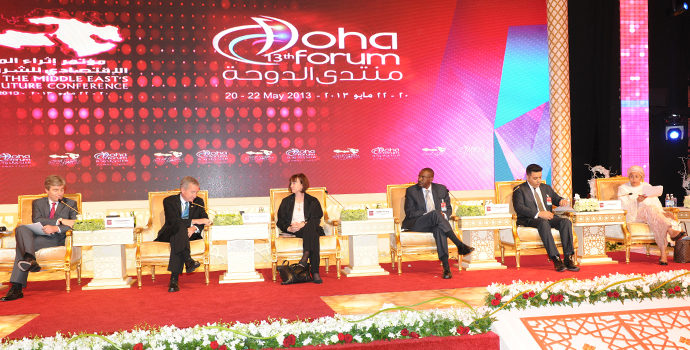


The international guests of honor this year will include some current Heads of State and Government. The Forum will also feature other distinguished opinion leaders, eminent political thinkers, decision – makers and members of parliament, renowned businessmen, academics, media figures and international organizations. These participants will contribute to a free, learned and stimulating debate on each of the many topics on the Forum's agenda, with a focus on the Arab Spring, the global financial and economic crisis, International Cooperation, Global Economy, Development, Human Rights and Digital Media.
The 13th Doha Forum will be held at the Ritz Carlton Hotel in the State of Qatar from 20-22 May, 2013. It will be attended by more than 600 participants representing over 80 countries and organizations.
Doha Forum Panel On International Cooperation Says There Is Scope For International Community To Help Arab Countries

- ● Panellists say intervention to prevent or end conflict is possible but has to be handled sensitively
Doha 21 May 2013: Doha Forum panellists, discussing the parameters of international cooperation and how that could help the Arab world, outlined avenues for helping countries in transition without interfering in the complex and often fragile processes of change.
“Transitions after conflict or democratic transitions whether gradual or revolutionary are essentially national processes and so actions of national figures are key to the success. International actors have to be modest,” said Sarah Cliffe, special adviser and assistant secretary-general for civilian capacities at the UN. “But that doesn't mean there’s no role to play.”
“It’s important to go back to the origin of the protests of the last three years. They were not taking place in classic development areas – Tunisia was highly praised for making the‘millennium goals’ before the revolution. But Mohammed Bouazizikilled himself… because he felt he was harassed by police and had no recourse to justice orpolitical participation to rectify that. It was a call for inclusion, justice, dignity and jobs,” Cliffe said, referring to the Tunisian fruit vendor whose death after setting himself alight in December 2010 unleashed an uprising in Tunisia and then other Arab countries.
Justice and jobs, she said, had been underplayed in the United Nations' original “millennium goals” for development according to which countries such as Tunisia or Egypt were judged by international organisations.
But she said now it was important for any aid to come via international institutions and to come quickly.
“We need to deliver fast because if countries are going through transitions involving building confidence between government and citizens then two-year projects are too long,” Cliffe said. “I was just in Yemen, where there have been enormous pledges for assistance, but many are for large infrastructure projects that won’t deliver in the next 12 months, before the next election.”
Jim Marshall, a former U.S. Congressman and president of the United States Institute of Peace, said businesses had an interest in promoting peace since that was key to economic development on a regional and global scale.
“Peace is good for business and the pursuit of peace in the pursuit of profit probably makes a lot of sense. No individual government in the world has the capacity to bring peace to world (alone), it takes partnership,” he said. “Modern scholarship has shown time and time again that peace is good for business… I am here to encourage a new initiative for global business.”
Eugene Karpov, Deputy Prime Minister of the Republic of Moldova, said that Moldova – which became independent in 1991 during the collapse of the former Soviet Union – had benefited enormously from international cooperation during its transition. “Foreign assistance was crucial in giving political support, loans and direct investment in the 10 years after communism fell,” he told the session.
Shahid Malik, a former UK minister for international development, said preventing conflict had a huge economic benefit but that governments often avoided reforms for fear of provoking strife.
“One conflict costsallof the world’s annual development aid. Every pound spent on preventing violent conflict saves the international community four pounds,” he said, recalling his efforts to persuade ousted Yemeni leader Ali Abdullah Saleh to remove subsides. “I gave him the IMF and World Bank line on subsidies… He said he had talked about that before and there were riots and people died.”
Turning to the Syrian conflict, which has raged over the last two years, Malik said it was a classic example of a conflict where there is reluctance to interfere but the costs of its continuation would be enormous. “Our inability to do the right thing for the people of Syria has been a key ingredient in getting to where we are today,” he said. “I am confident that the people here today are not the kind of people who are about doing nothing. I’m confident that slowly but surely we’ll start to move forward.”
- ● Sarah Cliffe, a UN special adviser:International actors should be modest but have a role to play.
- ● United States Institute of Peace head: Businessmen should pool efforts to invest in conflict resolution
- ● Former UK International Development Minister: Still confident of efforts to end Syrian conflict.